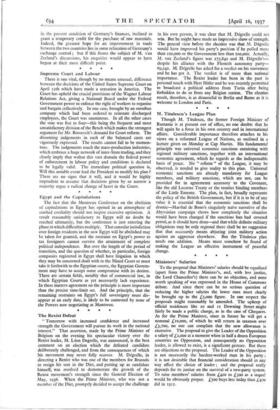Supreme Court and Labour There is one vital, though by
no means unusual, difference between the decisions of the United States Supreme Court on April 12th which have made a sensation in America. The Court has upheld the crucial provisions of the Wagner Labour Relations Act, giving a National Board under the Federal Government power to enforce the right of workers to organise and bargain collectively. In one case, brought by an omnibus company which had been ordered to reinstate discharged employees, the Court was unanimous. In all the other cases the vote was five to four—this being the frequent and most unsatisfactory division of the Bench which makes the strongest argument for Mr. Roosevelt's demand for Court reform. The dissenting judgements in each of the balanced cases are vigorously expressed. The results cannot fail to be momen- tous. The judgements touch the mass-production industries, which embrace a huge network of inter-State trading, and they clearly imply that within this vast domain the federal power of enforcement in labour policy and conditions is declared to be legally valid. The immediate political question is, Will this notable event lead the President to modify his plan ? There are no signs that it will, and it would be highly imprudent to assume that decisions given by so narrow a majority argue a radical change of heart in the Court.






















































 Previous page
Previous page